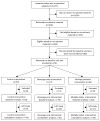Prevention of excess weight gain in paediatric primary care: beverages only or multiple lifestyle factors. The Smart Step Study, a cluster-randomized clinical trial
- PMID: 25251166
- PMCID: PMC4372512
- DOI: 10.1111/ijpo.260
Prevention of excess weight gain in paediatric primary care: beverages only or multiple lifestyle factors. The Smart Step Study, a cluster-randomized clinical trial
Abstract
Background: Insufficient evidence exists to support obesity prevention in paediatric primary care.
Objectives: To test a theory-based behaviour modification intervention delivered by trained paediatric primary care providers for obesity prevention.
Methods: Efficacy trial with cluster randomization (practice level) and a 12-session 12-month sweetened beverages decrease intervention or a comprehensive dietary and physical activity intervention, compared with a control intervention among children ages 8-12 years.
Results: A low recruitment rate was observed. The increase in body mass index z-score (BMIz) for the 139 subjects (11 practices) randomized to any of the two obesity interventions (combined group) was less than that of the 33 subjects (five practices) randomized to the control intervention (-0.089, 95% confidence interval [CI]: -0.170 to -0.008, P = 0.03) with a -1.44 kg weight difference (95% CI: -2.98 to +0.10 kg, P = 0.095). The incidences of obesity and excess weight gain were lower in the obesity interventions, but the number of subjects was small. Post hoc analyses comparing the beverage only to the control intervention also showed an intervention benefit on BMIz (-0.083, 95% CI: -0.165 to -0.001, P = 0.048).
Conclusions: For participating families, an obesity prevention intervention delivered by paediatric primary care clinicians, who are compensated, trained and continuously supported by behavioural specialists, can impact children's BMIz.
Trial registration: ClinicalTrials.gov NCT00241891.
Keywords: Behavioural economics; beverages; office visits; primary health care.
© 2014 World Obesity.
Figures
References
-
- Sobol-Goldberg S, Rabinowitz J, Gross R. School-based obesity prevention programs: a meta-analysis of randomized controlled trials. Obesity. 2013;21:2422–8. - PubMed
-
- Swinburn B, Malakellis M, Moodie M, et al. Large reductions in child overweight and obesity in intervention and comparison communities 3 years after a community project. Pediatric obesity. 2013 - PubMed
Publication types
MeSH terms
Associated data
Grants and funding
LinkOut - more resources
Full Text Sources
Other Literature Sources
Medical



